The Triumphant Return of Vertigo
The most influential comics imprint of all time is back in full force, as DC kicks off a new era for Vertigo.
Sandman. Fables. Preacher. Lucifer. iZombie. Y, the Last Man, Transmetropolitan, 100 Bullets. The Books of Magic. These are just some of the titles that have forged the legend of Vertigo.
Since the late 1980s, Vertigo has been DC’s imprint for cutting edge, mature comics that defy limitations and genre. Some of the greatest voices in comics, including Neil Gaiman, Garth Ennis, Grant Morrison, Brian K. Vaughan, Brian Azzarello, Ed Brubaker, Peter Milligan, Jamie Delano, G. Willow Wilson, and so many more have walked the razor’s edge of Vertigo and through daring and constant experimentation, have broken the barriers of traditional comics and crafted the future. But for the past few years, the Vertigo output has been sparse. Yes, there have been cool projects here and there, but even the most ardent Vertigo supporter would have to admit that the flame of Vertigo has been burning low.
That’s all about to change with the roll out of seven new Vertigo titles that will reignite the brand and remind people why Vertigo is the go to place for new ideas and innovative talent. We checked in with Vertigo Executive Editor Mark Doyle for a breakdown of all the dizzying new ideas that will soon be infecting the unsuspecting comic book market.
Just so you know, I’m a big Vertigo head from years back. I spent my formative years wearing eye shadow and black nail polish because of Neil Gaiman.
You too?
That being said, why is now the time in this busy marketplace for a DC Vertigo relaunch and rebrand?
It’s the 25th anniversary. Once something has been around for a while, it’s time to look at it and say, “What’s working, what’s not? What do we like about this? What don’t we like about this?” That’s kind of the catalyst to all this. And, it also felt like it was the right time to look at the kind of stories we were doing and reevaluate things.
The last few years, the Vertigo output has been small. Quality but small. I just finished Death Bed, I enjoyed Motherlands, and Of course you’ve had Astro City rocking because that book is just the best. How did you go from those few titles into a complete Vertigo relaunch?
I came back to Vertigo in spring 2017. We restructured the editorial team. There were a few editors who were already here and we brought in two other editors and me. In restructuring, we sat down and said, “What are we doing? What do we like? What aren’t we doing? Where do we want to relaunch?”
If you remember, July of last year is when we teased the idea of “8-8-18.” Because we knew at that point we were relaunching the entire line and Sandman Universe. We knew that’s where we would do it. That was us planting a flag and saying, “Hey, we might be sort of dormant for the next year, but we’re going to be putting some things out but keep your eyes out on this date because big things are coming.”
That gave us the time, and, honestly, I’m grateful for the company for saying, “Take a minute, take a breath, figure out what you want to do and then go from there.” The next step after planting that flag was: let’s sit down and talk about what we want to do, what type of stories do we want to tell? What do we want to publish? What are we excited to publish? What are we a little bit scared to publish? From there, let’s find the talent to meet that criteria.
To you, what makes a Vertigo creator in 2018?
It just has to be someone with a voice with something to say.
I don’t think you’ll argue with me when I say what’s going on in comics right now is because of the influence of Vertigo, because of Preacher and Sandman and Transmetropolitan and Y and 100 Bullets and everything. That kind of made the book market. That led the way. Do you feel a sense of responsibility to plant the flags now so people in 2045 will look back and be like, “Yup, we’re here because of Vertigo.”
One hundred percent. And responsibility is the right word. That’s what I feel when I walk into work every day. I, like you, love Vertigo. I found Vertigo at a time that mattered the most to me. I take it very seriously that it’s my job to carry that torch and tell stories for a new generation of readers. That’s the goal.
Why the rebranding of DC Vertigo? Why add the DC to the already established brand?
It’s part of an overall publishing plan. I think the company is making some great moves to go from DC Comics to DC Publishing with different books aimed at readers of different age groups, styles and tastes. It makes sense to be a part of that.
Obviously Vertigo’s bread and butter has always been the book market, are there any plans to try to keep increase the single issues’ presence in the direct market? How are you going to get those Wednesday warriors to support the single issues?
That’s a good question, and it’s an ongoing conversation. It’s a lot of stuff we’re doing that I can’t talk about yet.
One of the things we’re doing is that, rather than look at them as two markets we’re trying to look at it as creating a cohesive campaign with a message. The books are so diverse; you can’t just sell the books to the same person. It’s more about, how do you sell each of these books individually? How do we reach a potential audience that each one of these books have, and make sure that the message is clear from the periodical and direct market and trade market and book market. Make sure we have all the teams in the room together creating one cohesive campaign.
Further Reading: Sandman – The Essential Horror Comic of the 1990s.
The other half of it is, really, we have a lot of really smart plans from the digital side and house ad side. We want to engage the creator’s fan base. We have creators bringing in eyeballs from other media and other aspects of this business and reaching out to them.
How does Warners look at the Vertigo label knowing that you gave them iZombie, you gave them Lucifer, you gave them Preacher? I think every fan knows Sandman is the next Lord of the Rings waiting to happen, you just have to get the right visionary. 100 Bullets is one day going to take the world by storm. Does Warners look at Vertigo as an IP machine away from the superhero genre?
Yes, I think so. I am part of those conversations, but, look, at the end of my day, that’s not my job; my job is to make great comic books. That’s what I love to do. Look, I’m a total cinephile…I read comics because I want to read comics. I make comics because I want to make comics.
Right, I don’t think anyone wants to read a comic that is obviously a failed TV pitch. The Walking Dead was a great comic. No one had any idea that this could happen, and that’s why this happened.
Exactly, and I’m not looking at anything we are publishing now or developing now as anything that’s like, “Well, this would be a really expensive TV show so maybe we shouldn’t use aliens or spaceships.” I can’t do that. Anything that limits the creator, I’m not interested in. At the end of the day, that’s someone else’s job. I could make a great book. And look at the things that have been developed. The comics are an inspiration.
Right, I don’t think when anyone was reading Mike Carey’s Lucifer they said, “You know, this is going to be a really good police procedural one day!”
Exactly.
Talk about genres, other than Hex Wives from Ben Blacker and Mirka Andolfo and American Carnage by Bryan Hill and Leandro Fernandez, these new titles seem to be exploring genres outside Vertigo’s sweat spots of dark fantasy and crime. Is this a redefining of what DC Vertigo could be or can we expect more classic Vertigo books after the initial roll out?
I love all genres and I’m happy to explore them all. I’ve never thought of us as being about this genre or that genre, to me it’s always been about telling great stories and creating new characters. To do that, you have to be open. My hope is that we continue to grow and people see that we can do anything and everything. Historical fiction, romance, non-fiction…whatever. If it’s a great story it belongs here.
Let’s talk about each one of the new Vertigo books…
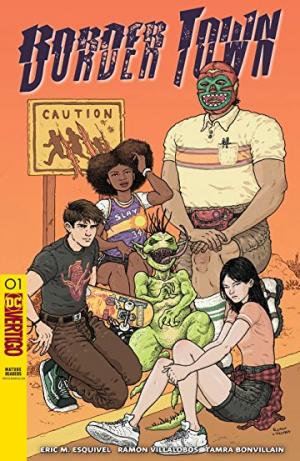
Border Town by Eric M. Esquivel and Ramon Villalobos
When a crack in the border between worlds releases an army of monsters from Mexican folklore into the small town of Devil’s Fork, Arizona, the residents blame the ensuing weirdness — the shared nightmares, the otherworldly radio transmissions, the mysterious goat mutilations — on “God-dang illegals.” With racial tensions supernaturally charged, it’s up to new kid in town Frank Dominguez and a motley crew of high school misfits to discover what’s REALLY going on. (September)
This seems like the most ripped-from-the-headlines type of new Vertigo book. Talk about the genesis of this project.
This sounds like I might be dodging the question, but honestly, when the pitch came in it was one of those pitches, I was like, “Yes, one hundred percent, yes!” It was a one page pitch at the beginning, and it just clicked.
But here’s exactly how this book got put together. It started when editor Jamie Rich was talking with Eric Esquivel. Eric had pitched a few things over the years. Jamie is editing the Batman books now, but he was here at Vertigo when I started, and we developed a lot of stuff together…Eric pitched a lot of stuff and nothing was clicking. Then Jamie went to Eric and did what good editors do which is say, “Pitch me the thing that only you can write. Pitch me the thing you can’t do anywhere else.” Eric regrouped and he came back with Border Town.
And here’s an interesting genesis, in between Jamie getting the pitch from Eric, Jamie moved over and did the Batman books full time, the book moved over to editor Andy Khouri. Andy loved the pitch, and immediately came back with Ramon as the artist. It was just sort of this combination one editor talking to a guy and being passed along and evolving. Watching them work together is incredible. There was this great moment where Jamie read it and thanked us because it was amazing.
There were some early disturbing, angry responses to this book including some disturbing stuff around San Diego Comic-Con, how do you deal with the risks surrounding such polarizing issues as you enter this new Vertigo line?
I mean, look, I don’t take any of this lightly, but, I look at it as, if someone is talking about this in a good way or a bad way, we’re doing our job right. We should be making books that elicit a response one way or another.
Right, you’re not doing Richie Rich.
Right. No. It goes back to your earlier question: What’s a Vertigo creator today? A Vertigo creator today is someone with a voice. And, Erica and Ramon have something to say. It’s my job to help them tell their story. If someone has a problem with that then don’t read the book, because frankly, I don’t want you anyway.
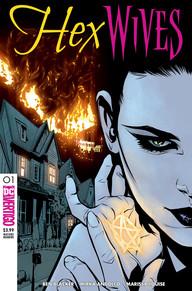
Hex Wives by Ben Blacker and Mirka Andolfo
“The women are too powerful. They must be tamed.” A malevolent conspiracy of men brainwashes a coven of witches to be subservient, suburban housewives. But it’s only a matter of time before the women remember their power… (October)
This seems like the most classic Vertigo style book of all the new titles. Was there a conscious choice of including a classic supernatural style Vertigo book?
Yes and no. We sort of started with the big picture top down question of what genres we want to do. But it wasn’t buckets we had to fill. It wasn’t like I kept hitting the pavement until I got a witch book. It wasn’t like that. But when it came in from Ben, you felt it scratching some itches. Not only did it feel like a classic Vertigo book, it felt very present. It felt like, “Oh yeah, with this set up we can absolutely explore some interesting things that we can explore right now.” Ben is just so genuinely interested in the process of everything… it really comes through in the work.
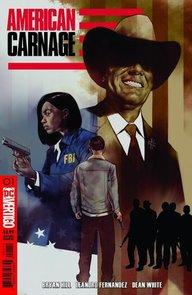
American Carnage by Bryan Hill and Leandro Fernandez
In this thrilling crime saga, disgraced FBI agent Richard Wright, who is biracial but can pass for white, goes undercover in a white supremacist group believed to be responsible for the death of a fellow agent. (November)
Bryan Hill has been killing it on Detective Comics. This book seems like it’s in the same zeitgeist as Spike Lee’s new film and the Vertigo classic Incognegro. What drew you to this book?
I think what I liked about this book is that it was a crime story. There was a high concept pitch to it. You’ll see when you start digging into it; it’s just an incredible, complex crime story where you have a hero that’s walking into a world thinking, “I get this. I can do this. I can subvert this.” Everything seems black and white and then everything changes once they get wrapped up in it.
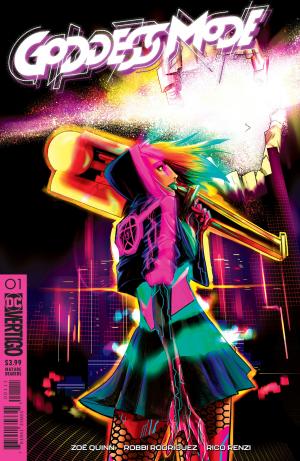
Goddess Mode by Zoë Quinn and Robbi Rodriguez
In a near future where all of humanity’s needs are administered by a godlike A.I., it’s one young woman’s horrible job to do tech support on it. But when Cassandra finds herself violently drawn into a hidden and deadly digital world beneath our own, she discovers a group of super-powered women and horrific monsters locked in a secret war for the cheat codes to reality. (December)
This seems the most experimental of the new line. What makes this a perfect part of the Vertigo launch?
I think experimental is a good word. I think some people might turn their nose up at experimental, but I think good things come out of experimental. Again, it was the guiding light on all these books. Is the talent someone who has something to say? When Andy Khouri brought me Zoë, I said, “Yes, that’s a great idea.” That’s one of the things we said from the very beginning, “Let’s bring in people who aren’t doing comics but could make great comics.”
One of the amazing things about all these people we reached out to, you start with a pitch of, “Hi, I’m an editor and Vertigo,” and we don’t have to do the full pitch because talent is like, “Yes, stop right there. I’m in.” All of these creators knew DC and Vertigo and was like, “Yes!” That was a really cool response. This was something that came out of conversations with Neil Gaiman and working on Sandman Universe.
One of the observations he had was that it was amazing working with the creators he was working with, the writers and artists both, all these people who grew up reading and adoring his work. I worked on the Batman books, and when you called people to work on Batman, they’d lose their minds. A similar thing happens with Sandman and the Sandman world… that’s a very cool thing to see. You have a whole generation of people who’d rather do a Sandman book and a Vertigo book.
Talk about working with the co-creator of Spider-Gwen Robbi Rodriguez. He seems to know what the readers want before the readers know it.
That’s a great way to frame Robbi. I’ve known Robbi for a long time. I first met him in San Diego about five hundred years ago, and he had a self-published book. This was like 2010. He was looking to do some stuff. I worked with on a Vertigo book I did called F.B.P. We did that book, we hit it off.
As I was developing the new Vertigo books, he reached out to me and said, “Hey, I’m going to be wrapping things up on Spider-Gwen, I’m looking for something else. I feel like a challenge, I want to come home to Vertigo. What have you got?” At the same time this pitch was being developed with Zoë and it seemed like a natural fit. He did a book called Frankie Get Your Gun. It’s funny you say Robbi is ahead of the curve, because this book was Mad Max: Fury Road before Fury Road. He knows what people wants before they want it.
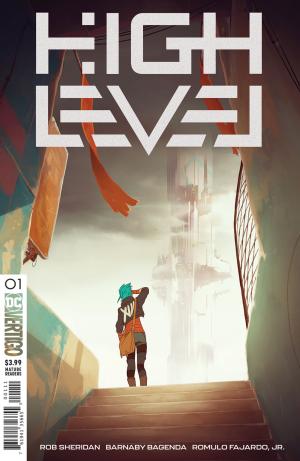
High Level by Rob Sheridan and Barnaby Bagenda
Hundreds of years after the world ended and human society was rebuilt from scratch, a self-interested smuggler with a price on her head is forced to traverse a new continent of danger and mystery to deliver a child messiah to High Level, a mythical city at the top of the world from which no one has ever returned. (2019)
Forgive my ignorance. I’m not familiar with this creative team.
It doesn’t surprise me that you’re not familiar because Rob comes from a different world. Rob comes from the music world. He was the artistic designer with Nine Inch Nails for years. He did concept designs and album designs. Web design was all Rob. He has this interesting aesthetic, but he always loved comics and is an interesting storyteller in his own right. When we reached out to him, he was like, “Yes, I’d love to do a Vertigo book.” Again, that was Andy Khouri coming to me and saying he thought of a person outside what we do but he likes what we do.
Barnaby worked with Andy on a book he first edited when he came to DC called Omega Men with Tom King. If you go back and look at that book, you’ll see what a terrific world Barnaby does with terrific characterization.
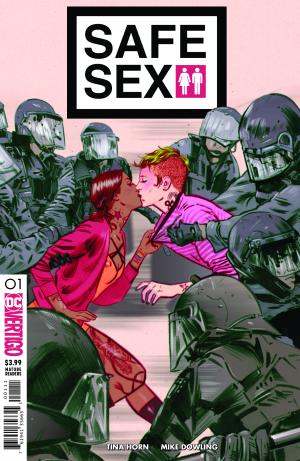
Safe Sex by Tina Horn and Mike Dowling
A dystopian sci-fi thriller about a ragtag team of sex workers fighting for the freedom to love in a world where sexual pleasure is monitored, regulated and policed by the government. (2019)
Safe Sex seems like it could be the sleeper hit of the line. Why should this book be on the readers’ radar? And please, tell us about how this book came about.
This book should be on readers’ radars because Tina is a great writer. She is another person that came outside of comics. She has this incredible podcast called Why Are People Into That?
In this case it was editor Amedeo Turturro who came to me and said, “Here’s an interesting person who never did comics.” I said, “Yes, we should reach out to her.” She immediately got it; she immediately got Vertigo and she had this really great, very relevant, very present pitch, but at the end of the day, it’s a story about love. It’s about people who want to love each other despite the world that’s around them. You frame all that in a dystopian heist narrative and I’m like, “Yes, great, I’m in.” But when you work with someone who’s never written anything before, you say let’s try a sample script to see if they do it. And she really nailed it. Early on, you can tell if someone is missing it, but she totally got it in terms of pacing a page and an issue, she got it.
Further Reading: Brian Michael Bendis and the Future of Jinxworld at DC
I agree with you, it could be a sleeper hit. It looks great, too. With comics like this, it comes down to what does it look like. But here, there’s a definite tone to the world. It feels like a superhero book even though it’s not a superhero book.
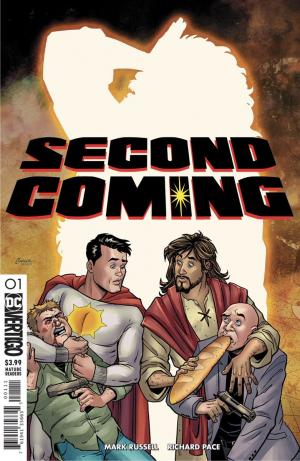
Second Coming by Mark Russell and Richard Pace
God sends Jesus to Earth in hopes that he will learn the family trade from Sun-Man, an all-powerful superhero, who is like the varsity quarterback son God never had. But, upon his return to Earth, Christ is appalled to discover what has become of his Gospel and vows to set the record right. (2019)
From The Flintstones to Prez to Snagglepuss, Mark Russell is a writer that creates hits in the most unexpected places. Talk about working with Mark and what drew you to Second Coming.
It was a great pitch. A good pitch is when someone pitches you the first line and you can see what the next ten issues will be. Going back to what Vertigo means and what we want to be publish…one of my favorite Vertigo books before I got to Vertigo was Preacher. I always though Vertigo was a place that was not afraid to attack institutions and satirize things. I think that the world needs that. I think you need to hold things up and say, “Look at this people. Should we be doing this?”
The top line of Mark’s pitch was funny, but once you dig into the story and characters, you see he’s incredibly real and honest and just wants to explore what it means to be a good person. He pitched two characters that represent two extremes of the spectrum and that’s where great drama comes from.
Any plans to incorporate classic DCU characters into the new Vertigo like the imprint has done in the past like Joe Lansdale did with Jonah Hex, and others did with Creeper, Haunted Tank, Deadman, hell, even Sandman.
The short answer to that is, that’s when I take off my Vertigo hat and put on my DC Black Label hat. That’s when people come to me and say, “Listen, I have this take on this character in a darker format,” that’s when we talk about Black Label.
Marc Buxton is a freelance contributor. Read all of his work here.